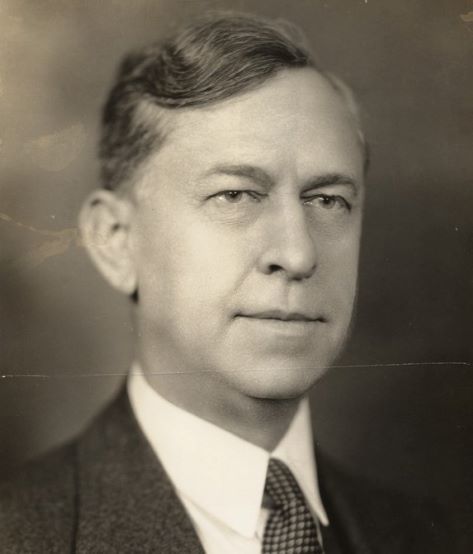- About MAA
- Membership
- MAA Publications
- Periodicals
- Blogs
- MAA Book Series
- MAA Press (an imprint of the AMS)
- MAA Notes
- MAA Reviews
- Mathematical Communication
- Information for Libraries
- Author Resources
- Advertise with MAA
- Meetings
- Competitions
- Programs
- Communities
- MAA Sections
- SIGMAA
- MAA Connect
- Students
- MAA Awards
- Awards Booklets
- Writing Awards
- Teaching Awards
- Service Awards
- Research Awards
- Lecture Awards
- Putnam Competition Individual and Team Winners
- D. E. Shaw Group AMC 8 Awards & Certificates
- Maryam Mirzakhani AMC 10 A Awards & Certificates
- Two Sigma AMC 10 B Awards & Certificates
- Jane Street AMC 12 A Awards & Certificates
- Akamai AMC 12 B Awards & Certificates
- High School Teachers
- News
You are here
Quotations in Context: Dickson
“Thank God that number theory is unsullied by any application.”
The quotation above is commonly attributed to Leonard Dickson, whose works include the three-volume series, History of the Theory of Numbers, published between 1919 and 1923. While the quotation does not appear in any published works written directly by Dickson, contemporary accounts that associate the quotation with him do exist.

Photograph of Dickson. University of Chicago Photographic Archive, [apf1-02157],
Special Collections Research Center, University of Chicago Library.
The attribution seems to trace back to the article “Graduate Student at Chicago in the Twenties,” which appeared in the April 1976 issue of The American Mathematical Monthly (a reprint can be found in volume 2 of the 1989 American Mathematical Society publication, A Century of Mathematics in America). The author of the article, William L. Duren, Jr., held a wide variety of faculty and administrative positions in his career, including serving as the very first Program Director in Mathematics at the National Science Foundation in 1952–1953 and as MAA President in 1955–1956. Duren did his graduate work at the University of Chicago, completing his PhD in 1930, and the article provided a short history of the program as well as many details of his experiences with the students and faculty there.
Dickson was one of the faculty at the University of Chicago and Duren mentioned taking his course in number theory. The quotation examined in this column appeared as part of a description of Dickson’s personality and teaching:
He was an indefatigable worker and in public a great showman, with the flair of a rough and ready Texan. An enduring bit in the legend is his blurt: “Thank God that number theory is unsullied by any application.” He liked to repeat it himself as well as his account of his and his wife’s honeymoon, which he said was a success, except that he got only two papers written [Duren 1976, p. 244].
The phrasing here is very curious: note that Duren said that the quotation was a “bit in the legend” and that Dickson “liked to repeat it himself.” One possible interpretation of the phrasing is that the quotation was originally invented and attributed to Dickson by some other source, and then Dickson simply liked the story so much that he continued to repeat it, but this might be reading too much into Duren’s choice of words.
I have found one example of a very similar quotation that is not attributed to Dickson, in the April 1892 issue of The Journal of the Royal Asiatic Society of Great Britain and Ireland. The following sentence appeared in the introduction to a notice written by Hartwig Hirschfeld for the book A Memoir on the Coefficients of Numbers by Brajendranath Seal:
It is said that the German mathematician Kronecker, at a scientific gathering in Berlin, proposed the health of The Theory of Numbers, the only branch of mathematics, perhaps of human learning, as yet unsullied by a practical application [Hirschfeld 1892, p. 397].
Unfortunately, it is unclear whether the entire statement is being attributed to Leopold Kronecker, or if the assertion that number theory is “as yet unsullied” was the book reviewer’s personal assessment. In either case, although this article does not entirely predate Dickson (who would have been eighteen at the time), it does offer a possible alternative source for the origin of the quotation.

Photograph of Kronecker, 1865. Public domain, Wikimedia Commons.
Bonus Quotation in Context (at no extra charge): The vague mention above of a scientific gathering in Berlin might be a reference to the 1886 Berlin Conference of Natural Scientists. According to the 1892 obituary of Kronecker by Heinrich Weber, it was at this conference that Kronecker made the famous statement, “Die ganzen Zahlen hat der liebe Gott gemacht, alles andere ist Menschenwerk” [Weber 1893, p. 15], or “God made the integers, all else is the work of man.”
References
Duren, William L. 1976, April. Graduate Student at Chicago in the Twenties. The American Mathematical Monthly 83(4): 243–248.
Hirschfeld, Hartwig. 1892. Notices of Books: A Memoir on the Coefficients of Numbers. Being a Chapter in the Theory of Numbers. By Brajendranth Seal. Journal of the Royal Asiatic Society of Great Britain and Ireland 24(2): 397.
Weber, Heinrich. 1893. Leopold Kronecker. Mathematische Annalen 43: 1–25.
“Quotations in Context” is a regular column written by Michael Molinsky that has appeared in the CSHPM/SCHPM Bulletin of the Canadian Society for History and Philosophy of Mathematics since 2006 (this installment was first published in November 2017). In the modern world, quotations by mathematicians or about mathematics frequently appear in works written for a general audience, but often these quotations are provided without listing a primary source or providing any information about the surrounding context in which the quotation appeared. These columns provide interesting information on selected statements related to mathematics, but more importantly, the columns highlight the fact that students today can do the same legwork, using online databases of original sources to track down and examine quotations in their original context.
Michael Molinsky (University of Maine at Farmington), "Quotations in Context: Dickson," Convergence (September 2024)




